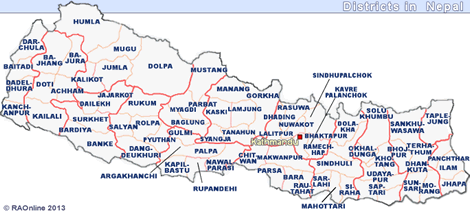Maoists'
heavy attack on security forces in Bhojpur district could be a sign of
shift in their strategy. The rebels have attacked army and police personnel
guarding communication installations in Bhojpur. The office of a local
administrator and a bank were also attacked. The telephone tower was destroyed.
The scheme of the attack was similar to those in the mid-western districts
before the beginning of 2003's peace talks.
Maoist
rebels had appeared to have been pushed onto the defensive in recent months.
Analysts had a general impression that the rebels were finding it more
difficult to launch big attacks against the joint mobilisation of the army,
police and paramilitary forces. The focus of the security operations had
been in mid-western Karnali area and in the Kathmandu valley. This strategy
is said to have forced the rebels to move east to escape security operations.
Last year reports from Rolpa said that Maoist hard core fighters have disappeared
from this region. However, the Maoists announced in their news statements
they were preparing big offensives. The Bhojpur incident could be the start
of the Maoist rebels' offensive in the eastern parts of the country.
Maoist top leader Prachanda said the CPN-Maoist had no problem with multi-party polity and revealed that the rebels were in favor of an election of constituent assembly by demobilizing the armies on both sides. The United Nations or any international human rights group should be called in to observe such elections. The CPN-Maoist still holds that the demand of roundtable conference, interim government and the election of constituent assembly are the minimum conditions to gain the political objectives it has set out for. The leader added that the ultimate aim of the party is to establish republicanism through the process of constituent assembly. According to statement published by a Maoist-run online news service, absolute sovereignty of the people, secularism, a unified national military, regional and ethnic sovereignty and multi-party democracy, are the political commitments of the party. Press freedom and intellectual liberty will be guaranteed if their rule is established, he mentioned. January 2004
CPN-Maoist district-level cadres said Maoist rebels are ready to join hands with foreign States - with the exception of the US and the UK - if the donors are ready to cooperate with their local government in the field of development. The Maoists said that foreign donor agencies should take permission from their regional office in Nepalgunj if they want to conduct development activities in the mid-western region. The donors were warned not to start any project without the Maoist's consent. However, the location of Maoist regional office in Nepalgunj is still unknown. January 2004
Across
the villages of Achham, Kalikot and Bajura in the Maoist-controlled heartland
of mid-western Nepal, it is election time this month. The Maoists are filling
the vacuum left after the Deuba government declined to extend the terms
of elected local councils two-and-a-half years ago.
To
counter the government move to nominate VDC members, they are conducting
their own elections for village and district "people's governments". Sixty-two
of the 75 VDCs in Achham have held elections, of which 23 polls were held
with votes being cast, in 30 the Maoists won unanimously, and in eight
villages, local representatives were appointed by the Maoist party. In
Kalikot to the north, independent candidates have won some positions in
four village-level elections while the Maoists have swept all positions
in 13 of the VDCs. The Maoists have their own election commission which
drafted guildelines for the polls.
January 2004
Maoists
and leaders of Joint Revolutionary Council at Thawang village of Rolpa
have declared an "autonomous region of Magarat". Around 75,000 Magars of
the district attended the function. "Thawang village is the seat of the
Singha Magarat autonomous province and that the province's parliament will
soon be named," a Maoist statement said. According to the statement,
a 27-member people's government led by Santosh Budha Magar has been formed
in the region. A total of 130 "peoples' representatives" elected the government,
the statement said.
|






